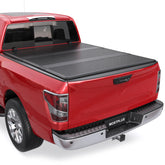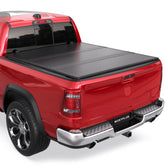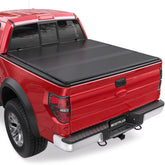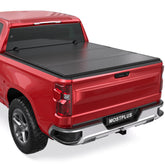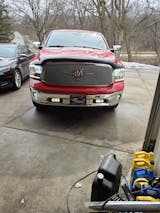Diesel vs Gas Truck: What’s the Difference?
For anyone weighing the ultimate diesel vs gas truck decision, the choice represents a fundamental trade-off between raw capability and daily practicality. For decades, the debate between a diesel and a gasoline-powered truck has been a central discussion among drivers who need serious capability. When considering a diesel or gas truck, it's more than just a question of fuel. It's a decision that impacts performance, economics, and lifestyle. While both types of engines are designed to get the job done, they achieve their goals through fundamentally different means, leading to distinct advantages and trade-offs.
Gasoline engines have long been the default choice for their affordability and refinement, while diesel engines are renowned for their brute strength and legendary longevity. But in today's market, with advancements in technology for both power plants, the line has blurred. So, what truly sets them apart? This article will delve deep into the engineering, performance, and ownership experience to guide you through the critical differences, helping you determine which one is the right tool for your needs.

The Core Difference: How They Make Power
The most fundamental distinction between diesel and gas engines lies not in their components, but in their thermodynamic process—how they convert fuel into motion.
Gasoline Engines
Spark Ignition: Gasoline engines operate on the Otto cycle. They mix fuel with air in the intake manifold or cylinder, compress this mixture with the piston, and then ignite it at a precise moment using a spark plug. This controlled explosion forces the piston down, creating power. This process is optimised for high rotational speeds (RPMs), which is why gasoline engines produce their peak power high in the RPM range. However, gasoline is highly volatile, and to prevent premature, uncontrolled detonation (knocking), the compression ratio—the degree to which the air-fuel mixture is squeezed—is limited, typically to a range of 10:1 to 13:1.
Diesel Engines
Compression Ignition: Diesel engines operate on the Diesel cycle. They take in only air during the intake stroke and compress it to an extreme degree, with compression ratios often ranging from 15:1 to 23:1. This compression superheats the air to temperatures exceeding 1,000°F (538°C). At the peak of compression, a high-pressure fuel injector sprays a fine mist of diesel fuel directly into this superheated air. The fuel instantly ignites from the heat and pressure alone, without needing a spark plug. This method results in a more forceful and efficient expansion of gases, generating immense force on the piston right from the start of the power stroke.
This core difference in ignition dictates everything that follows: diesel's superior low-end torque, higher efficiency, and heavier construction, versus gasoline's smoother operation, higher horsepower, and lower initial cost.

Head-to-Head Comparison: Diesel vs Gas Pickup
Power & Performance: Torque vs. Horsepower
The performance character of these engines is a study in contrasts, best understood by separating horsepower (hp) and torque (lb-ft).
- Gasoline: The Horsepower King: Horsepower is a measure of how fast work can be done. Gas engines, with their ability to rev high and fast (often to 6,000 RPM or more), excel at producing high horsepower figures. This translates to faster acceleration and higher top speeds. For a light truck that is used primarily for daily commuting or occasional, rapid merging onto highways, a gas engine's horsepower advantage provides a more responsive and familiar driving feel.
- Diesel: The Torque Monster: Torque is a measure of twisting force—the immediate, grunting power that gets a heavy load moving. Due to their high compression ratios and longer piston strokes, diesel engines produce massive amounts of torque at very low RPMs, often as low as 1,500-2,000 RPM. This gives diesel trucks an almost effortless feeling when pulling away from a stoplight or climbing a steep grade, as the engine doesn't need to strain or rev high to access its peak power. It's this low-RPM torque that makes a diesel feel so unstoppable under load.
Towing & Payload Capacity
This performance characteristic directly dictates towing prowess.
- Diesel for Max Loads: The diesel's torrent of low-end torque is perfectly suited for moving extremely heavy loads. It minimises strain on the drivetrain when starting from a standstill and provides immense confidence when climbing hills, reducing the need for frequent downshifting. Consequently, modern heavy-duty diesel trucks (e.g., Ford F-250/F-350, Ram 2500/3500, Chevrolet Silverado 2500/3500) almost universally boast higher maximum towing and payload ratings than their gasoline counterparts.
- Gas for Mainstream Needs: For the vast majority of towing needs—such as a medium-sized travel trailer, a boat, or a load of landscaping materials—a modern half-ton gas truck (e.g., Ford F-150, Ram 1500, Chevrolet Silverado 1500) is more than capable. While it may need to rev higher and downshift more frequently on inclines, the power output of today's turbocharged V6 and V8 gas engines is substantial enough for loads up to 12,000-13,000 pounds.

Daily Driving & Refinement
Here, the gasoline engine traditionally holds a significant advantage.
- Gasoline: Smooth and Quiet: Gas trucks are generally quieter, smoother, and more vibration-free at idle and during acceleration. The exhaust note is subdued, and cabin refinement is typically superior. For a vehicle that will see 95% of its use as a daily driver, the gas truck offers a more car-like, comfortable experience.
- Diesel: The Clatter and Shake: Diesel engines are inherently noisier and produce more vibration due to the high-pressure combustion process. While modern sound deadening and engine technologies have made cabin noise levels remarkably better, the characteristic diesel clatter at idle and under acceleration is still present. Additionally, diesel trucks are almost always heavier, which can translate to a slightly stiffer ride when unloaded.
Long-Term Costs & Ownership
The financial picture, a core component of the cost of owning a diesel truck vs a gas truck, is complex and depends heavily on usage patterns and time horizon.
- Diesel: High Entry, Potential Long-Term Payoff: A diesel engine option typically adds $8,000 to $10,000 to the sticker price of a new truck. Maintenance costs are also higher; oil changes require more oil and specialised filters, and fuel filter changes are critical and more frequent. However, diesel engines are built with overbuilt components to withstand extreme cylinder pressures, leading to legendary durability. It is not uncommon for a well-maintained diesel engine to surpass 300,000 miles without a major overhaul. This superior longevity can result in a higher resale value down the line.
- Gas: Lower Entry, Predictable Costs: The initial purchase price and routine maintenance costs for a gas truck are significantly lower. While a gas engine's lifespan, often estimated at 200,000 miles before major issues, is shorter than a diesel's, the lower upfront investment can be a decisive factor for many owners.

Fuel Economy & Range
This is one of the diesel's most significant advantages, directly impacting the diesel truck vs gas truck mpg comparison. Regardless of your choice, there are ways to maximise efficiency. For instance, installing a MOSTPLUS tonneau cover is a proven and simple upgrade that can save MPG by reducing turbulent air drag in the truck bed, making it a smart investment for both diesel and gas truck owners looking to squeeze every mile out of a tank.
- Diesel: The Efficiency Champion: Diesel fuel contains about 10-15% more energy per gallon than gasoline. Combined with the diesel engine's higher thermal efficiency (more energy from the fuel is converted into work), this results in significantly better fuel economy, especially under load. It is common for a heavy-duty diesel truck to achieve 18-22 MPG on the highway, while a comparable gas truck might manage 12-15 MPG. This superior efficiency also translates into a much longer driving range between fill-ups, a major advantage for long-haul towing or remote travel.
- Gas: Adequate for Most: While improving with technologies like cylinder deactivation and turbocharging, gas trucks still cannot match the unloaded and, especially, loaded fuel efficiency of a diesel. For drivers with shorter commutes or infrequent towing, the absolute fuel cost savings may not offset the diesel's higher initial price.

Cost Analysis
The price of diesel fuel versus gasoline fluctuates constantly and varies by region. Historically, diesel has often been more expensive per gallon. Therefore, the financial benefit of a diesel comes not from cheaper fuel, but from using less fuel per mile, particularly when working hard. The break-even point—where the fuel savings offset the higher purchase price—can take many years and tens of thousands of miles to reach, and is primarily achievable for owners who frequently tow heavy loads.
Durability & Longevity
As mentioned, diesel engines are built to endure immense internal pressures. Their components—such as the block, crankshaft, and connecting rods—are significantly heavier and stronger. They also lack a high-voltage ignition system (no spark plugs, ignition coils), which is one less system to fail. This overbuilt nature is the primary reason for their exceptional longevity, making them the undisputed choice for owners who plan to keep a truck for hundreds of thousands of miles.
Environmental Considerations & Technology
This area has seen dramatic changes.
- Emissions Legacy: Traditionally, diesel engines produced high levels of nitrogen oxides (NOx) and particulate matter (soot).
-
Modern Solutions: To meet stringent emissions standards, modern diesel trucks are equipped with complex and costly after-treatment systems. These include:
- Diesel Particulate Filters (DPF): Trap soot particles, which are periodically burned off in a process called regeneration.
- Selective Catalytic Reduction (SCR): Injects a urea-based solution (commonly known as DEF or Diesel Exhaust Fluid) into the exhaust stream to convert NOx into harmless nitrogen and water.
- While these systems have made modern diesels remarkably clean, they add complexity, cost, and a recurring expense (DEF must be replenished every few thousand miles). Gasoline engines, with their sophisticated catalytic converters, generally have a cleaner emissions profile for common pollutants, though they produce more CO2 per gallon of fuel burned due to lower efficiency.
Which Truck is Right for YOU?
Choose a DIESEL truck if:
- You frequently tow heavy loads (e.g., large fifth-wheel trailers, heavy equipment) exceeding 10,000 pounds.
- You need the maximum available payload and towing capacity.
- You drive very high annual mileage, especially while towing, making the fuel economy advantage financially meaningful.
- You plan to keep the truck for well over 200,000 miles and prioritise long-term durability.
- The higher initial purchase price and maintenance costs fit within your budget.
Choose a GAS truck if:
- Your truck will primarily be a daily driver with occasional light to medium towing or hauling.
- Initial purchase price and routine maintenance costs are primary concerns.
- You value a quieter, smoother, and more refined driving experience.
- You do not drive enough high-mileage, heavy-tow miles to justify the diesel premium.
- You typically trade in vehicles before reaching 150,000 miles.

Conclusion
The diesel vs gas truck debate has no single winner; the right choice is entirely dependent on the buyer's specific use case and priorities. The diesel truck stands as the undisputed champion of heavy-duty work: a torque-rich, efficient, and incredibly durable tool for those who demand maximum capability and are willing to pay a premium for it. The gasoline truck, meanwhile, remains the versatile and pragmatic choice for the majority of buyers: it offers ample power for most tasks, greater refinement for daily life, and a significantly lower cost of entry. By honestly assessing your towing needs, driving habits, budget, and long-term plans, you can move beyond the hype and select the powertrain that truly serves as the right tool for your job. This clear-eyed analysis is the ultimate goal of any diesel vs gas truck comparison.
FAQs
How much money will a diesel truck save vs gas?
The savings are not guaranteed and are highly dependent on usage. You will save on fuel consumption (more miles per gallon), but you must offset the significantly higher upfront cost and maintenance. For a driver who rarely tows, it may take a decade or more to break even, if ever. The savings are most significant for owners who frequently tow heavy loads over long distances, where the diesel's fuel economy advantage is most pronounced.
Do diesel trucks last longer than gas trucks?
Yes, as a general rule. Diesel engines are built with heavier, more robust components to withstand their high compression ratios, leading to a longer potential service life. It is common for well-maintained diesel engines to reach 300,000-500,000 miles, whereas gas engines often begin to require major repairs beyond 200,000 miles.
Is diesel better than gas in cold weather?
This is a mixed bag. Modern diesel engines have advanced glow plugs and intake air heaters that make cold starts far more reliable than in the past. However, diesel fuel itself can gel in extreme cold as paraffin wax in the fuel solidifies. This requires the use of winterized fuel or fuel additives. Gasoline has fewer cold-weather fuel issues, but both modern engines are generally very capable in cold conditions with proper preparation.
Are diesel trucks better for off-roading?
It depends on the type of off-roading. The diesel's immense low-end torque is excellent for slow, technical rock crawling or climbing steep grades, as it provides precise throttle control without stalling. However, diesel trucks are significantly heavier, which can be a disadvantage in sandy or muddy conditions where they are more prone to sinking. Their heavier weight can also be a factor in extreme articulation situations.
Why do diesels have trouble starting in the cold?
Diesel engines rely on compressing air to create extreme heat for ignition. In very cold weather, the engine block and incoming air are so cold that the compression process may not raise the air temperature high enough to ignite the fuel. This is why diesels use glow plugs (small heaters that warm the combustion chamber) and intake air heaters to ensure successful ignition when the engine is cold.
Featured Products
- $589.99
- $589.99
- Unit price
- / per
- $569.99
$585.99- $569.99
- Unit price
- / per
- $599.99
$609.99- $599.99
- Unit price
- / per
- $599.99
$649.99- $599.99
- Unit price
- / per
